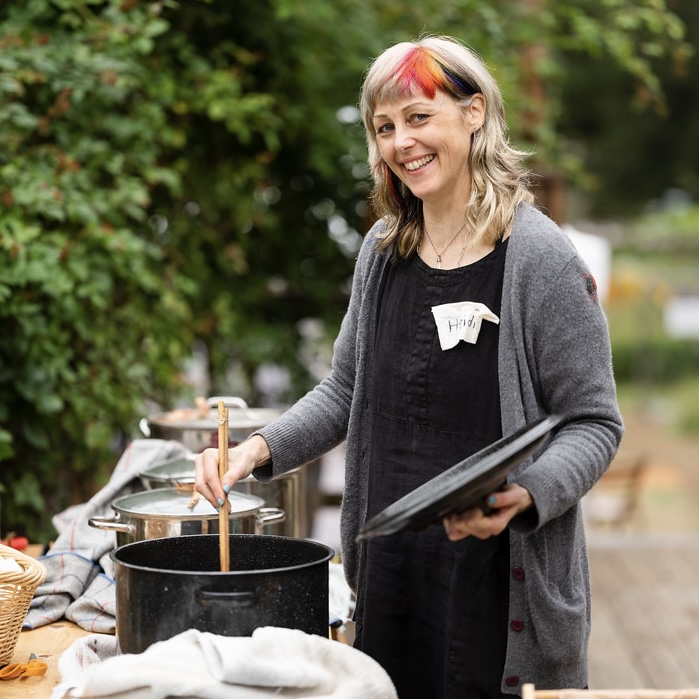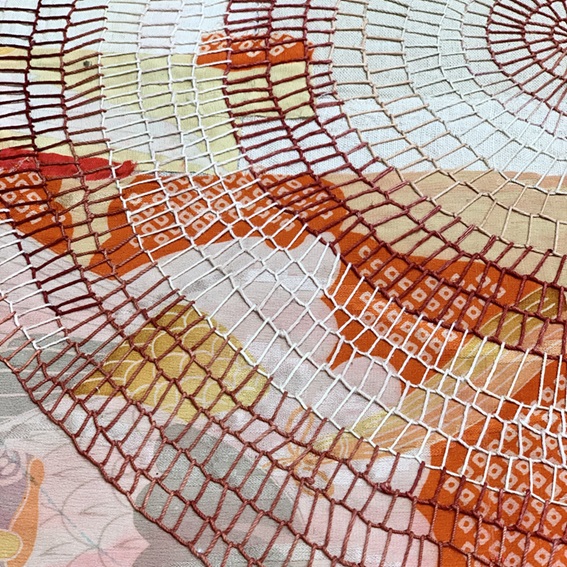In Stitches
Heidi Iverson of Honeyfolk Clothing
Heidi Iverson, a founding member of Fibershed, is a textile artist, clothing designer, and natural dye advocate who focuses on minimum waste practices. She teaches classes in natural dying, mending, and slow stitching and lives in a second-growth redwood forest in western Sonoma County with her husband and two ridiculous cats.
Made Local: Tell us about how you began your fiber arts career.
Heidi Iverson: It began when my grandmother taught me how to embroider and crochet when I was six. After that, I started making abstract quilts, clothing, and costumes, which eventually led to knitting and soft sculpture. My love of textiles just grew and evolved and is still evolving.
ML: What are the main projects you’re working on right now?
HI: I have three main projects now. I’m designing and illustrating a series of hand-sewn patchwork patterns. I’m also documenting all the possible natural dye plants within a five-mile radius of my studio and creating a series of textile-based works celebrating the hidden colors and plant magic. The biggest project is a book that I’m not able to discuss in detail at this time.
ML: Your work has evolved over the years—you layer in new things—from knitting and natural dyes to sewing and mending—and zines! Tell us how you get inspired.
HI: My inspiration comes from the plants and landscapes that surround me. I love exploring and experimenting and finding joy in mundane things. I think it’s really important to step outside of your comfort zone and celebrate mistakes. It’s how we learn, and it changes how we see things.
ML: Handwork is a bit of a lost art these days. We buy fast fashion, and don’t generally make our own things. Why do you think there is a need today for work done with the hands?
HI: Handwork and stitching are wonderful ways to set intentions, hold heart space, and create a visual dialog that expresses what can’t always be expressed with words. Working with our hands is very grounding and meditative. It teaches us how to slow down in a world that is constantly bombarding us with information telling us to do more, want more, and consume more.
ML: You’ve been involved with the Fibershed movement for many years. How has Fibershed impacted your work and how might you have impacted the movement?
HI: The Fibershed has had a massive influence on my work. It was my first introduction to natural dyes and slow fashion. It made me think about my clothing in a different way. I don’t know if I feel like I’ve had a significant impact on the movement. But I love sharing my experiences and making slow crafts like natural dying and mending more accessible.
ML: What workshops are you teaching in May-June?
HI: I’m teaching a new workshop from June 19 to 23 during Art Stays at Emandal in Willits. It’s all about exploring slow stitching and intuitive embroidery. We’ll be learning a variety of hand stitches and sewing techniques while making a stitch journal to celebrate the Summer Solstice. I also teach a casual class online every month for all my Patreon members. It varies from patchwork projects, embroidery stitches, and natural dyes.
ML: How do you think art—and handwork in particular—has changed your outlook on life?
HI: Art, and handwork in particular, has made me appreciate the functionality and beauty of everyday objects, especially textiles. I’ve always felt that art teaches you a different way of seeing. I love making things with my hands that can be used. I find it grounding and meditative. Handwork is my way of telling a story without words. Especially when I make a garment that I love and wear, mending it and layering it with naturally dyed fabric and stitches, over-dying it with indigo, extending its life and giving it more time to tell another story.
honeyfolkclothing.com
GLOSSARY:
What is Fibershed?
In 2010, Rebecca Burgess established Fibershed in the San Francisco Bay Area, aiming to address the ecological and societal consequences of the textile industry. Fibershed is a non-profit that cultivates regional fiber systems that foster ecosystem and community well-being. Burgess coined the term “Fibershed” to represent a local textile system prioritizing raw materials, supply chain transparency, and interconnectedness from skin to soil.



